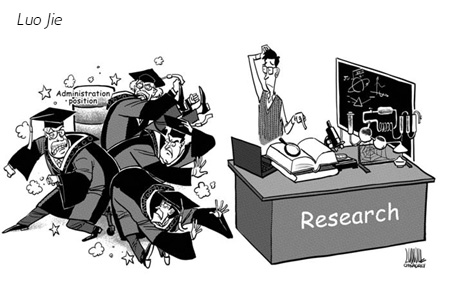
|
OPINION> OP-ED CONTRIBUTORS
 |
|
A move in the right direction
By Cong Cao (China Daily)
Updated: 2009-10-24 07:42
 On Sept 10, 2009, Zhu Qingshi, former president of the University of Science and Technology of China (USTC), and an elite member of the Chinese Academy of Sciences, was appointed founding president of the South University of Science and Technology (SUST) for a five-year term. The appointment marks not only the end of a global search - which lasted more than one year and attracted more than 200 candidates - for the new university's president, but also a milestone in the development of the university. I have high expectations for the university, which is being built in Shenzhen, a city that was the "window" to China's reform and opening policy. The expectations come first from my appreciation of Zhu's conviction to end bureaucratization in Chinese universities. China's higher education has been widely criticized, particularly for its bureaucratization. Strangely enough, each Chinese university is assigned an administrative rank, from the so-called "vice-ministerial level," to "bureau level," and so on.
Although Zhu Qingshi was "unconventional" - rare in Chinese officialdom - it is quite conceivable that as a non-member of the Chinese Communist Party, he must have been subject to enormous institutional constraints during his 10-year tenure as president of USTC. Zhu had, however, fully utilized whatever freedom he was allowed and pushed the envelope. He has been admired for refusing to enlarge enrollment at USTC, for insisting that teaching evaluation be done truthfully, and for criticizing the examination-oriented education system that has suffocated the youth. Now, it seems that Zhu Qingshi, as president of a new university that is expected to be more liberal, finally has the opportunity to run its administration based on his understanding of the true nature of modern higher education, in particular, the pursuit of "academic freedom, autonomy, and professorial governance." Zhu's vision may turn SUST into a phenomenal academic institution, and eventually, a world-class one through his tireless efforts and those of his successors. Hopefully, this is not just my wishful thinking. There is a famous quotation attributed to Chairman Mao Zedong: "On a blank sheet of paper free from any mark, one can write the freshest and most beautiful words and paint the freshest and most beautiful pictures." This also is my great expectation for SUST. I have always believed that it is easier to innovate in a new institution than to promote reform in an existing one. The Chinese have developed uneasy personal relations as a result of continuous political campaigns and other unfortunate events. These, combined with the so-called "red-eye disease," or jealousy, and other factors, have brought about constant friction. In a brand new institution with no historical legacy or "burden," less conflict will arise, as everyone will be a newcomer, especially at its start-up stage. Therefore, things could go relatively smoothly. Ten years ago, the Chinese Academy of Sciences set up a new Institute of Neuroscience in Shanghai as an important strategic step to promote basic scientific research and a pilot of the academy's Knowledge Innovation Program. In 2003, the state established a new National Institute of Biological Sciences in Beijing. Despite varied views about these institutions, their excellence in scientific research, no doubt, points to the possibility of a new model. Now, with the rapid economic growth and the deepening of the reforms, China can afford to innovate its institution of higher education on a much larger scale to meet the daunting talent challenge. Indeed, by engaging an international executive search firm in a worldwide search for its president, SUST has already started on an unusual, if not radical, path. SUST will have a new campus built from scratch on the campus, reflecting its sufficient funds, and it will also recruit a faculty based on international standards. As such, the tensions that have existed elsewhere between veterans and newcomers, and between returnees and those trained domestically, can be avoided. Hopefully, the presidential term and age limits will be lifted so that Zhu Qingshi and his successors could serve for longer periods to overcome the short-term perspective that dominates other Chinese universities. Of course, Zhu has to prove his ability - to create an institution that is conducive to turning out remarkable talent and achievements. When the Institute of Neuroscience was established, there were questions as to whether the model it represented would exert influence beyond that of a basic research institute. There were even concerns that it would become a so-called "isolated island." While I have the same concerns about SUST, I look forward to the emergence of a truly innovative institution in Shenzhen, which embodies the spirit of modern university and can become a role model for other Chinese institutions of higher education. In this sense, both SUST and its president have a long way to go. Cong Cao is a senior researcher at the Neil D Levin Graduate Institute of International Relations and Commerce, State University of New York. (China Daily 10/24/2009 page4) |